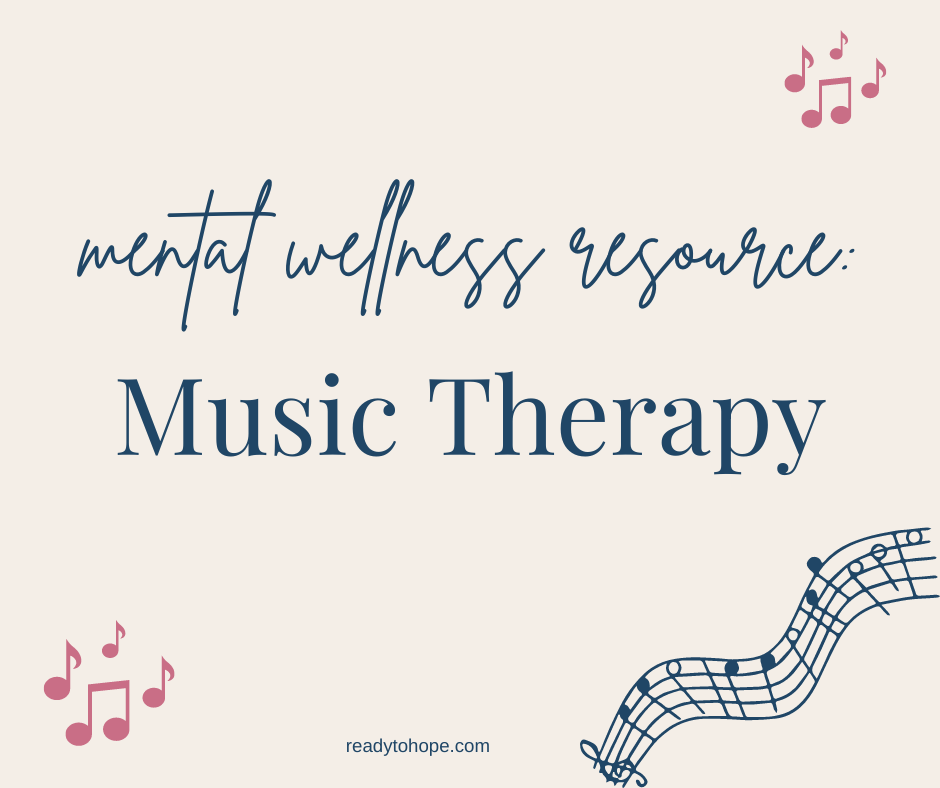Resource: Music Therapy

Even if you have never heard of music therapy, many of us already know the power that music has to shift a mood in an instant. Sometimes it lifts us up out of a funk, sometimes it helps us calm down when we’re stressed or anxious, and sometimes it helps us let the tears flow when we need the cathartic clearing-out of a good cry.
Today let’s explore the ways that you can use music as a tool to not only manage challenging emotions, but also to help you achieve positive emotional states.
Before we do that though, let’s dive into the science so you can feel even more confident as you lean into music as a tool in your toolbox: what does the literature say about music as a therapeutic tool?
What science tells us about music therapy:
In a study at the Anesthesiology and Critical Care unit at the University of Pennsylvania, researchers discovered that during medical procedures music has the power to be just as effective as drugs to calm patients. They studied over 150 patients, giving half an anti-anxiety medication frequently used in medical procedures, while the other half listened to “Weightless†by Marconi Union. Both groups received the respective treatments three minutes before the procedure.
What did they learn? Both groups had similar levels of anxiety! So the music therapy was just as effective as the drug, but obviously without any risk of side effects!
Another study was done on college students who listened to “green noise,†which is similar to white noise but on a different frequency that is more similar to what might be found in nature. These students listened specifically to the sounds of waterfalls and waves, and afterwards performed better on cognitive tests involving alertness and focus.
What does that tell us? Music can shift our mood in significant and powerful ways, and deserves a spot in our mental wellness toolbox!
A few of the ways that music helps us mentally and emotionally include:
Regulating emotion: Listening to calming music can help us shift from anxious to relaxed, or sad to upbeat.
Distraction: Sometimes enjoying our favorite music, of any genre, is a simple way to tune in to the music and escape for a moment.
Physiological benefits: Music has been shown to produce shifts in heart rate, blood pressure, and cortisol (the stress hormone) levels. Listening to soothing music can help us slow our breathing and decrease muscle tension.

Self-expression: Discovering the music you love can help you better understand yourself, and help contribute to your sense of identity.
Social bonding: Sharing an interest in particular music genres or artists can be a way to connect with others. Sharing musical experiences like listening together, whether live or recorded, can reduce loneliness and provide opportunities for meaningful connections.
Now you have a sense of how music can benefit you mentally and emotionally, so how might you apply music as tool in your toolbox?
How you can use music to improve your mental wellness:
FIRST: note that music will always be subjective! Yes, “Weightless†by Marconi Union was used in a study successfully to help with pain reduction, but undoubtedly not every subject responded in exactly the same way, because we all respond to art in our own very unique ways.
So know this: all of these recommendations are meant to be made your own! You may find country music relaxing and to another person it makes their skin crawl. Art is subjective and in the eye (or ear) of the beholder (listener)!
For stress relief:
~Play calming music (whatever you find calming!) to attain a more relaxed state.
~Play upbeat music to workout or dance to blow off stress or pent up anger, frustration, or just excess energy.
~Play soothing music to help you tune out the world, and maybe even to drift off to sleep or meditate.

For productivity:
~Play background music to study. For some it can be music with lyrics, others might focus well to classical music, and still others might need white or brown or pink noise.
~Using music to be more productive can mean that you use it to motivate you. Some people find it helpful to play upbeat music or their favorite music while doing tasks like cleaning or organizing.
For simple enjoyment of music as an art form:
~Those of us who love music know that sometimes you want to listen just to enjoy your favorite artists or to get acquainted with new artists.
~Sometimes you want to listen to lyrics the way we love reading poetry or books, and feel the feelings that the lyrics produce for you. And the same can be done with tuning into the instruments, the melodies, and the rhythms.
Finally, here are a few takeaways from The Huberman Lab Podcast, where he discussed “How to Use Music to Boost Motivation, Mood, and Improve Learningâ€
- Music with 140-150 beats per minute can be used to motivate you to work out or do other physical activities.
- Nine minutes = the recommended listening time to boost mood. Of course you can always listen longer, but nine is the number that seems to produce the shift.
- Listening to your favorite music is NOT helpful for studying or focusing, because you are more likely to be distracted by the music and your attention will be pulled towards it and away from the task at hand.
- Listening to music during your study break, then turning it off when you return to studying, may help with focus.
Hopefully this has helped you gain a better understanding as to how you can use music to support your mental wellness, from boosting mood to self-soothing when stressed to being more productive.
The next question of course is: which music works for you?!
We are always striving to build our toolbox for our workshops and Ready to Hope Club, so we love to hear what you love! You can comment below or email us here and share with us your favorite artists and playlists, and we will absolutely add them to our resources!

